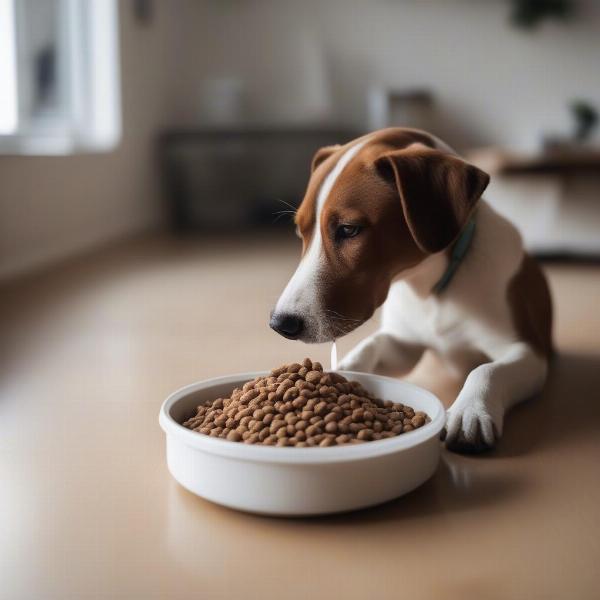Royal Canin Hepatic dog food is a specially formulated diet designed to support dogs with liver disease. This comprehensive guide will explore the benefits, ingredients, feeding guidelines, and frequently asked questions about Royal Canin Hepatic, helping you understand if it’s the right choice for your canine companion.
Liver disease can significantly impact a dog’s health, and proper nutrition is crucial for managing the condition. Royal Canin Hepatic addresses the specific nutritional needs of dogs with liver issues, helping to improve their quality of life. This diet is often prescribed by veterinarians to help manage various liver conditions, including chronic hepatitis, copper storage disease, and portosystemic shunts. The unique formulation helps to reduce the liver’s workload and provides essential nutrients for overall health.
Understanding Liver Disease in Dogs
Liver disease in dogs can manifest in various ways, with symptoms often subtle and easily missed. Common signs include lethargy, jaundice (yellowing of the skin and gums), vomiting, diarrhea, and weight loss. If you notice any of these symptoms, it’s essential to consult your veterinarian for a proper diagnosis. Early detection and appropriate management, including dietary changes like switching to Royal Canin Hepatic, can significantly improve the prognosis.
Benefits of Royal Canin Hepatic Dog Food
Royal Canin Hepatic offers several key benefits for dogs with liver problems. The reduced protein content helps minimize the liver’s workload, while the high-quality protein sources ensure that your dog still receives essential amino acids. The restricted copper levels are particularly important for dogs with copper storage disease, preventing further accumulation of copper in the liver. The diet is also enriched with antioxidants to help protect liver cells from damage. The added zinc helps reduce copper absorption, further supporting liver health. Additionally, the palatable formulation encourages consumption, even in dogs with decreased appetite.
Ingredients and Nutritional Profile
Royal Canin Hepatic’s ingredients are carefully selected to provide optimal nutrition for dogs with liver disease. The formula typically includes highly digestible carbohydrates, such as rice and corn, for energy. Moderate levels of high-quality protein, like chicken and pork by-products, provide essential amino acids without overtaxing the liver. The diet is also rich in vitamins, minerals, and antioxidants, including Vitamin E and C, to support overall health and protect liver cells.
 Dog Eating Royal Canin Hepatic
Dog Eating Royal Canin Hepatic
Feeding Guidelines and Transitioning to Royal Canin Hepatic
It’s crucial to follow your veterinarian’s recommendations for feeding Royal Canin Hepatic. The recommended daily amount will depend on your dog’s weight, age, and severity of liver disease. To avoid digestive upset, gradually transition your dog to the new food over several days, mixing increasing amounts of Royal Canin Hepatic with their current food.
Monitoring Your Dog’s Progress
Regular veterinary check-ups are essential for monitoring your dog’s response to Royal Canin Hepatic. Your veterinarian may recommend blood tests to assess liver function and adjust the diet as needed. Be sure to report any changes in your dog’s appetite, weight, or overall condition to your veterinarian.
Conclusion
Royal Canin Hepatic dog food offers a targeted nutritional solution for managing liver disease in dogs. Its specific formulation helps reduce the liver’s workload while providing essential nutrients for overall health. By following your veterinarian’s recommendations and monitoring your dog’s progress, you can help improve their quality of life and manage their liver condition effectively. Remember to consult your veterinarian for personalized advice and to ensure that Royal Canin Hepatic is the right choice for your dog.
FAQ
- Is Royal Canin Hepatic suitable for all dogs with liver disease? While beneficial for many, it’s crucial to consult your veterinarian to determine if it’s appropriate for your dog’s specific condition.
- How long should my dog stay on Royal Canin Hepatic? The duration depends on the individual dog and their response to the diet. Your veterinarian will advise on the appropriate length of time.
- Can I mix Royal Canin Hepatic with other dog foods? It’s generally recommended to feed Royal Canin Hepatic exclusively to ensure your dog receives the correct balance of nutrients. Consult your veterinarian before mixing it with other foods.
- What if my dog refuses to eat Royal Canin Hepatic? Try warming the food slightly or mixing it with a small amount of warm water to enhance the aroma. If your dog continues to refuse the food, consult your veterinarian.
- Where can I purchase Royal Canin Hepatic? It’s typically available at veterinary clinics and specialized pet food stores.
- Are there any side effects of Royal Canin Hepatic? Some dogs may experience mild digestive upset during the initial transition period.
- Is Royal Canin Hepatic expensive? It’s generally more expensive than regular dog food due to its specialized formulation.
ILM Dog is a leading international dog website dedicated to providing expert advice on dog care and wellbeing. We cover a wide range of topics, from breed selection and health care to training, nutrition, grooming, and product recommendations. For further information on dog nutrition and health, explore our extensive resources on ilmdog.com. Contact us at [email protected] or +44 20-3965-8624 for personalized advice. ILM Dog offers expert guidance on every aspect of dog ownership, including choosing the right food for your dog’s specific needs.